Last in a three-part series, this presentation looks at the “four Ps” (Prioritize, Perspective, Preservation, and Perseverance) for maintaining a successful academic-research career
The following is a transcript of the presentation video, edited for clarity.
Balancing Experiences
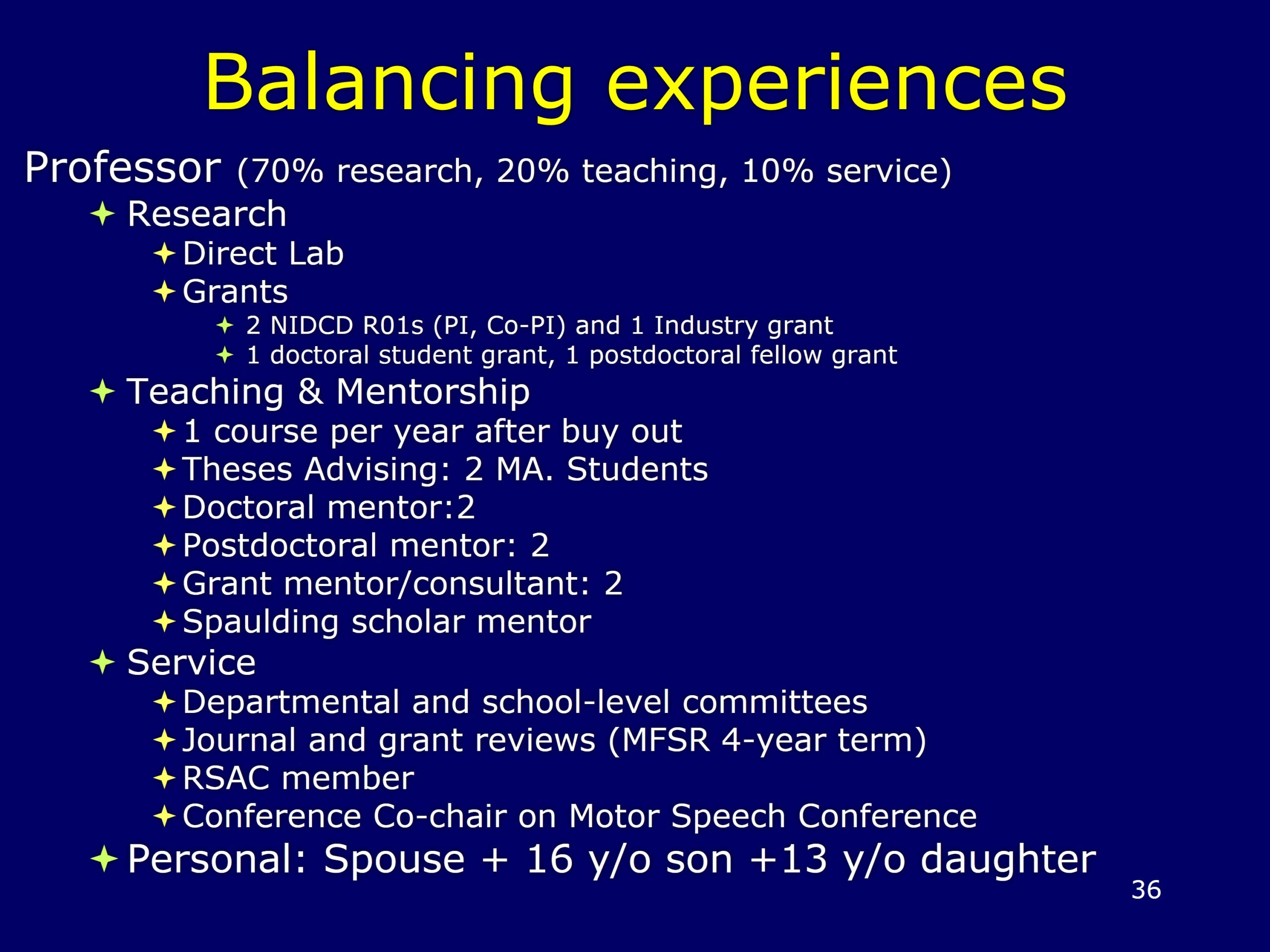
When I was asked to do this, I was thinking about the advice that I give to PhD students and postdocs, and I tried to summarize some of that, so it’s very personal. It’s what works for me.
I have a lot of responsibilities, we all do. We’re very busy with research, we’re busy with service, we’re busy with teaching.
Success = Busyness
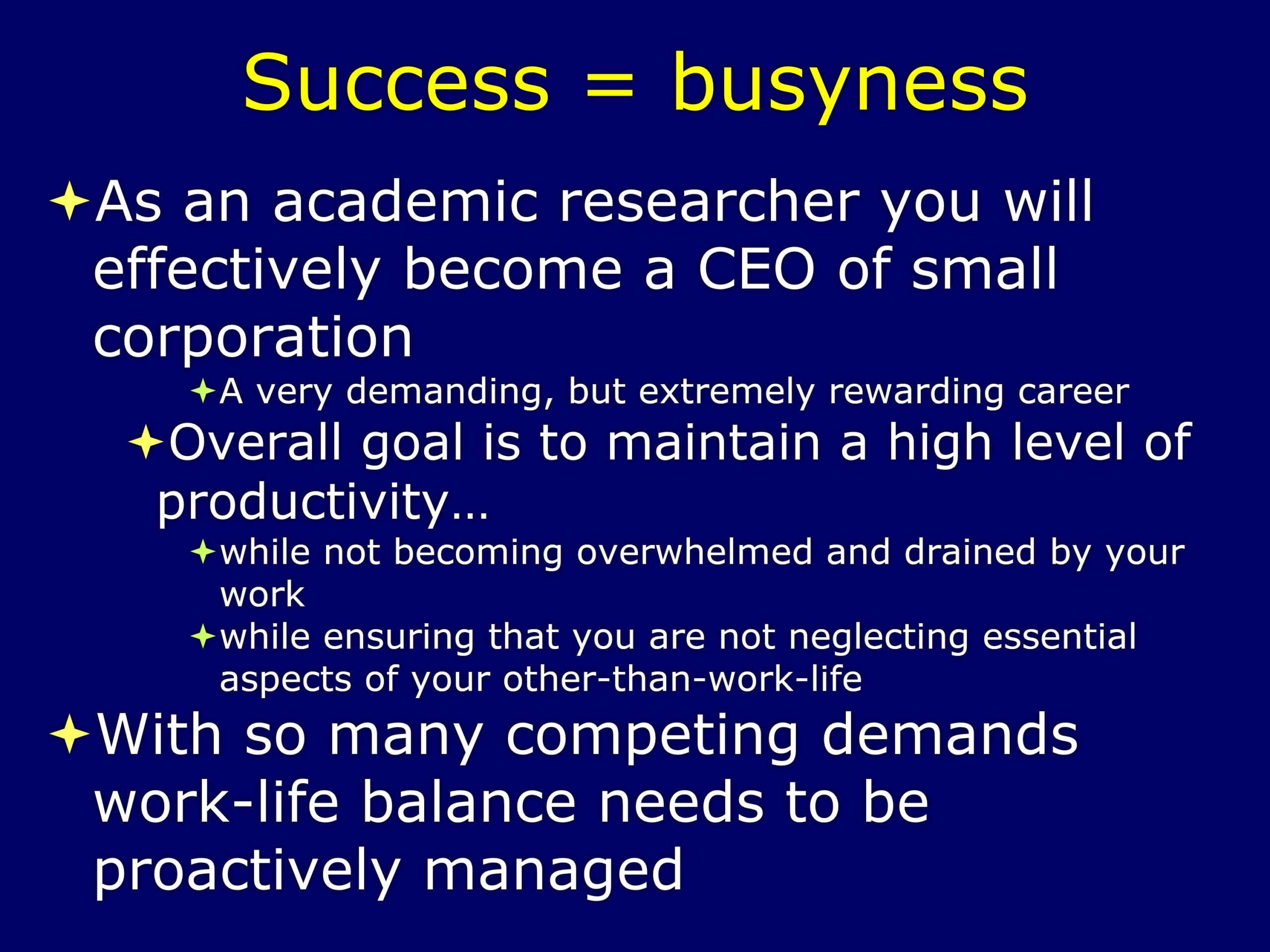
That brings up the point that success is busyness.
If you’re successful in research, you’re essentially going to become a CEO of a small corporation. You’re going to manage employees, you’re going to have budgets to deal with. It’s a very dynamic process. But we don’t get training in that — especially the management part.
It’s a very demanding, but extremely rewarding career.
So the overall goal is to try to maintain a high level of productivity when you know you’re faced with so many things to do. You don’t want to be overwhelmed with your work, you don’t want to be drained by your work. Instead, you want your work to feed you. And you want to ensure you’re not neglecting the other aspects of your life outside of work.
With so many competing demands, it’s important to be very proactive about how you manage your time.
The Four Ps of Work-Live Balance
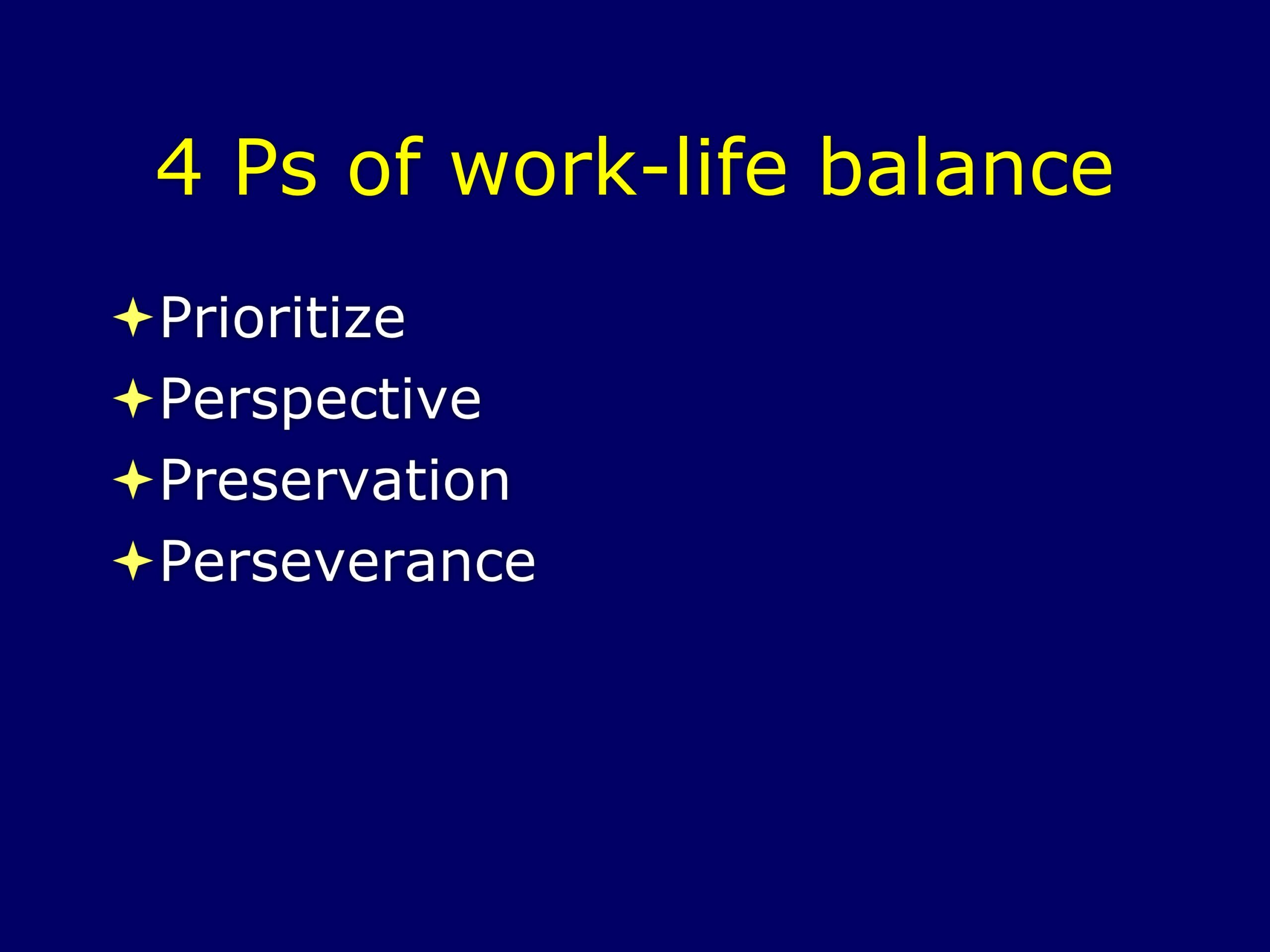
As I was reflecting on this, I thought there were four main topics, and they all happened to start with “P.” So that’s the 4 Ps of work-life balance.
Prioritize 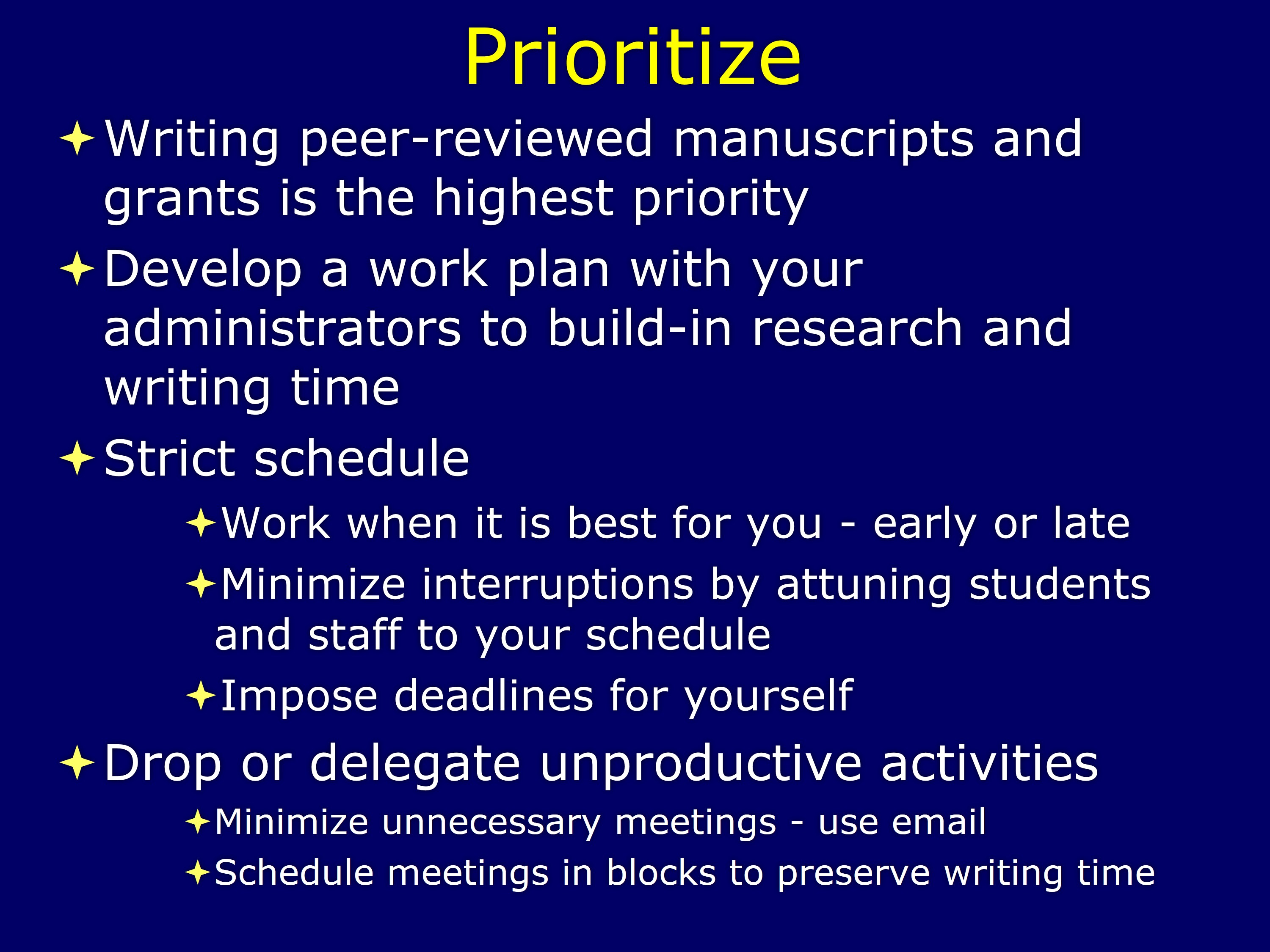
The first one is Prioritize.
You all know by now that writing is everything. Peer reviewed manuscripts are the currency. And you need to focus on writing and find time for writing. You wouldn’t be here if you didn’t know that. But it is surprising that sometimes I talk to junior faculty and they tell me, “Oh, I didn’t realize that writing was everything, and I’d have to clear my schedule and that peer reviewed manuscripts were then number one thing,” and so on. You’ve heard it many, many times.
The first thing you want to do is develop a work plan with your administrators, just to make sure everybody is on the same page. You want to align your priorities withe the institution’s priorities.
You also want to make sure that you adhere to a strict schedule. Work when it’s best for you. I work early in the morning. I like to write first thing, when nobody is around in the office and I can get some things done, it’s a good time for me to focus. That doesn’t work for everybody.
You want to minimize interruptions when you’re writing, but tuning students and your staff to your schedule. I think most of my staff know to not bother coming by my office before 9 in the morning. The door is shut, and I’m working, and I will not be as receptive to questions at that time.
Imposing deadlines on yourself is very important. Time just slides by, as you know.
You want to drop or delegate unproductive activities. Minimize any unnecessary meetings. Meetings are great, meetings are essential if you’re going to be a manager. If you want to be an effective manager, you’re going to have to have meetings. But you really need an agenda, and you want to ask yourself, “Is this meeting necessary.” Use email if possible.
Schedule meetings in blocks so that it’s more efficient. Because sometimes the start time and the stop time waste time.
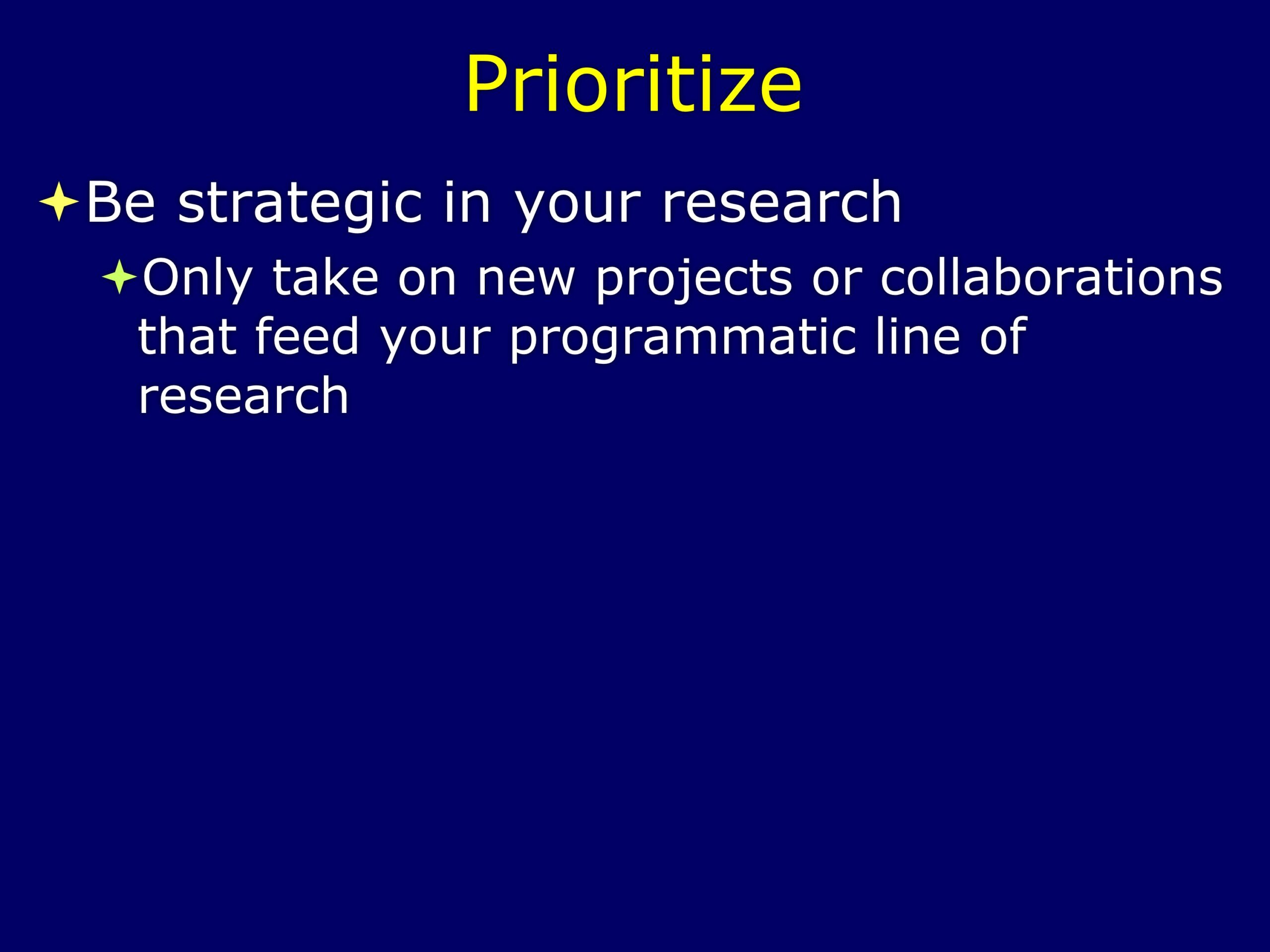
Karen and Holly talked a lot about being strategic in research. You have to be very careful about taking on new collaborations, particularly when you are pre-tenure. Most of you are very talented, you have amazing skill sets and there are plenty of people in your environment who will look at your work and say, “Oh, wow. That would add an interesting component to my work.” Make sure it’s also helpful for your work. Think very carefully about taking on new projects.
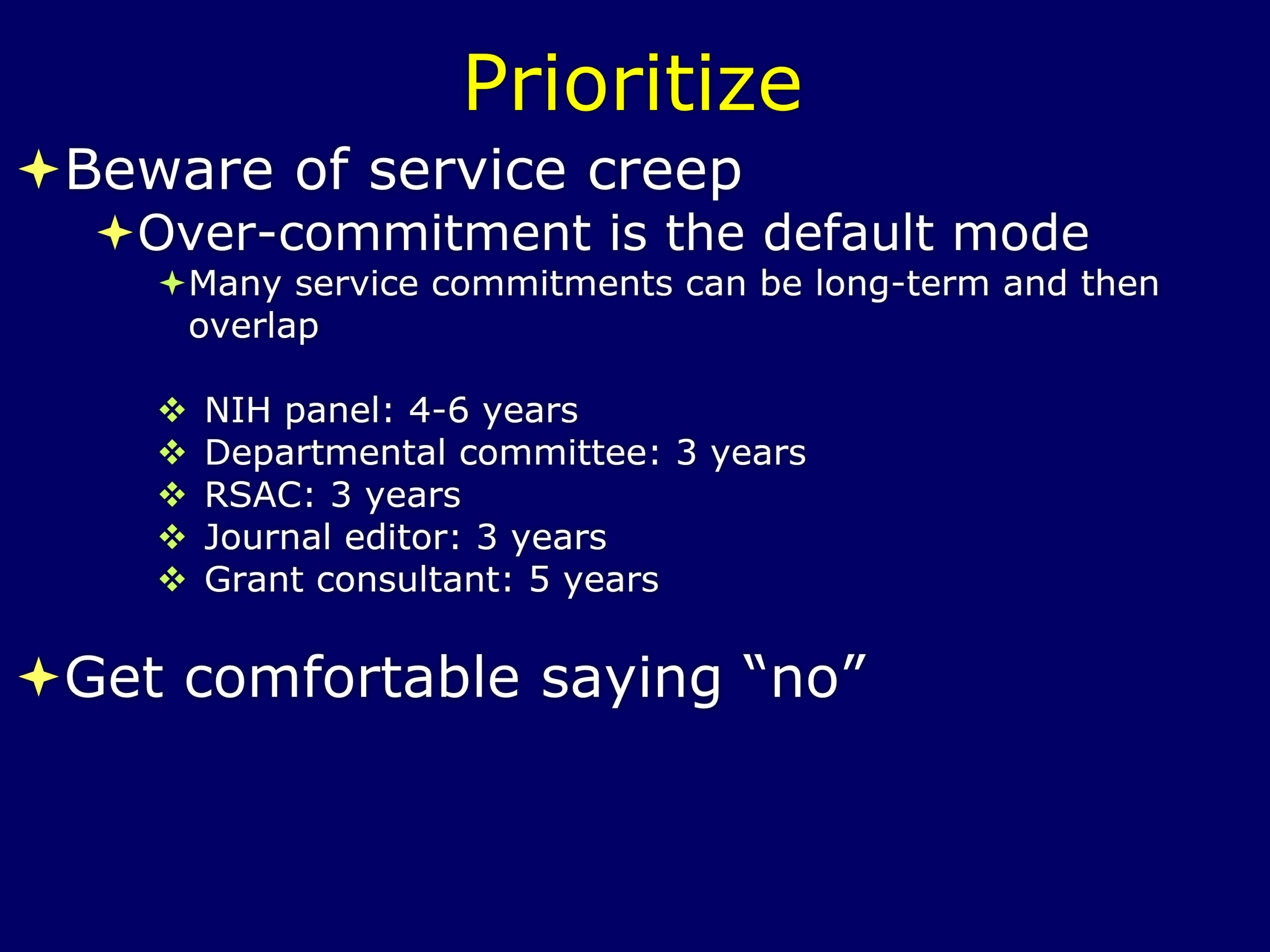
Beware of service creep. A lot of service commitments are protracted. That’s fine. Service is essential. It’s important. But when you have overlapping terms on some of these long-term panels — an NIH panel can be between 4 and 6 years, this RSAC commitment is 3 years, departmental committees are 3 years — a lot of times you don’t see them coming, and if they are all overlapping at once, things can become crazy and you start to neglect your research.
You have to get comfortable saying “no” and you have to be strategic in how you are doing that. You can’t just say “no” to your administrators, right? But what you can do is say, “Well, what are my priorities? Let’s go back to my agreement, and is this in alignment with my priorities for this year?” Then you can have a conversation about whether you should be on this committee or not.
Perspective
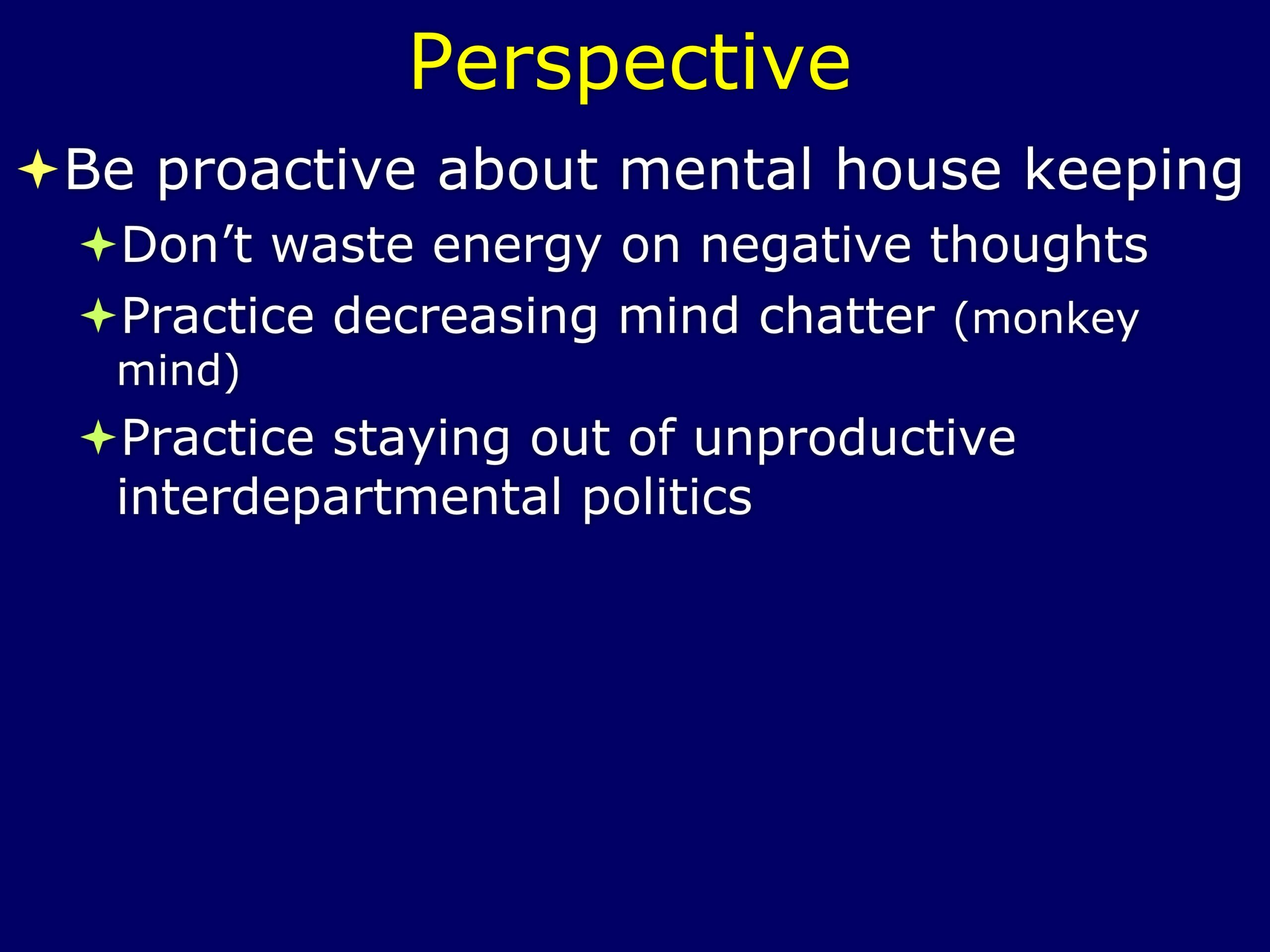
It’s very important to have the right perspective. I think, in this career where we’re exposed to peer review, we’re exposed to criticism, you have to be very proactive about your mental housekeeping. You don’t want to waste time on negative thoughts, it’s very unnecessary. Practice decreasing mind chatter — whatever your method to do that. And practice staying out of departmental politics.
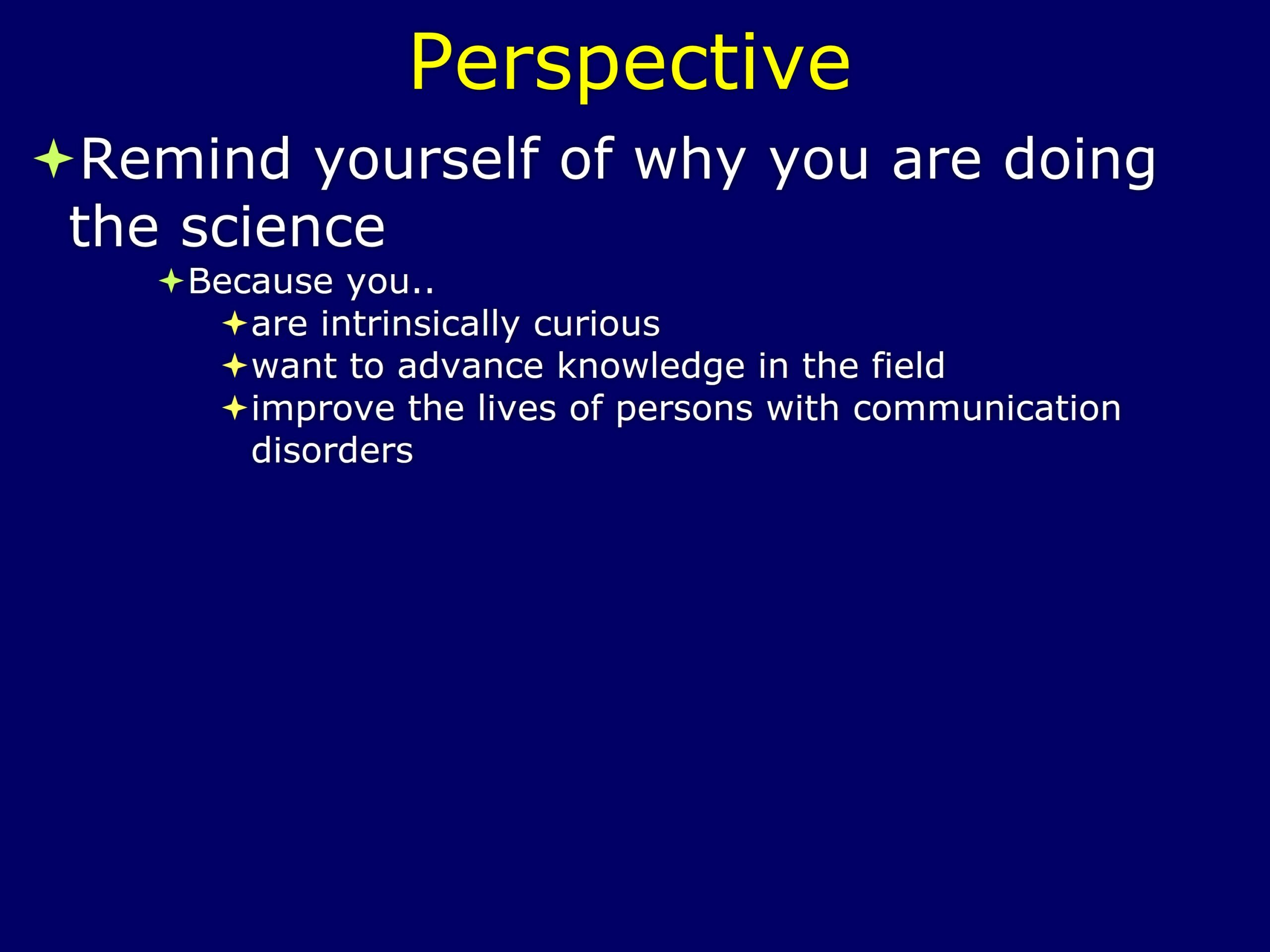
Remind yourself of why you’re doing the science. You have to step back every once in a while. We’re in the trenches, we’re writing, it’s intense, you’re reviewing, we’re very focused on our problems. But then, it’s very helpful for me sometimes to say, “I’m doing this because I’m fully engaged, I’ve very curious about this problem. I want to advance knowledge in the field; I want to improve the lives of persons with communications disorders.” That broader perspective once in a while is essential.
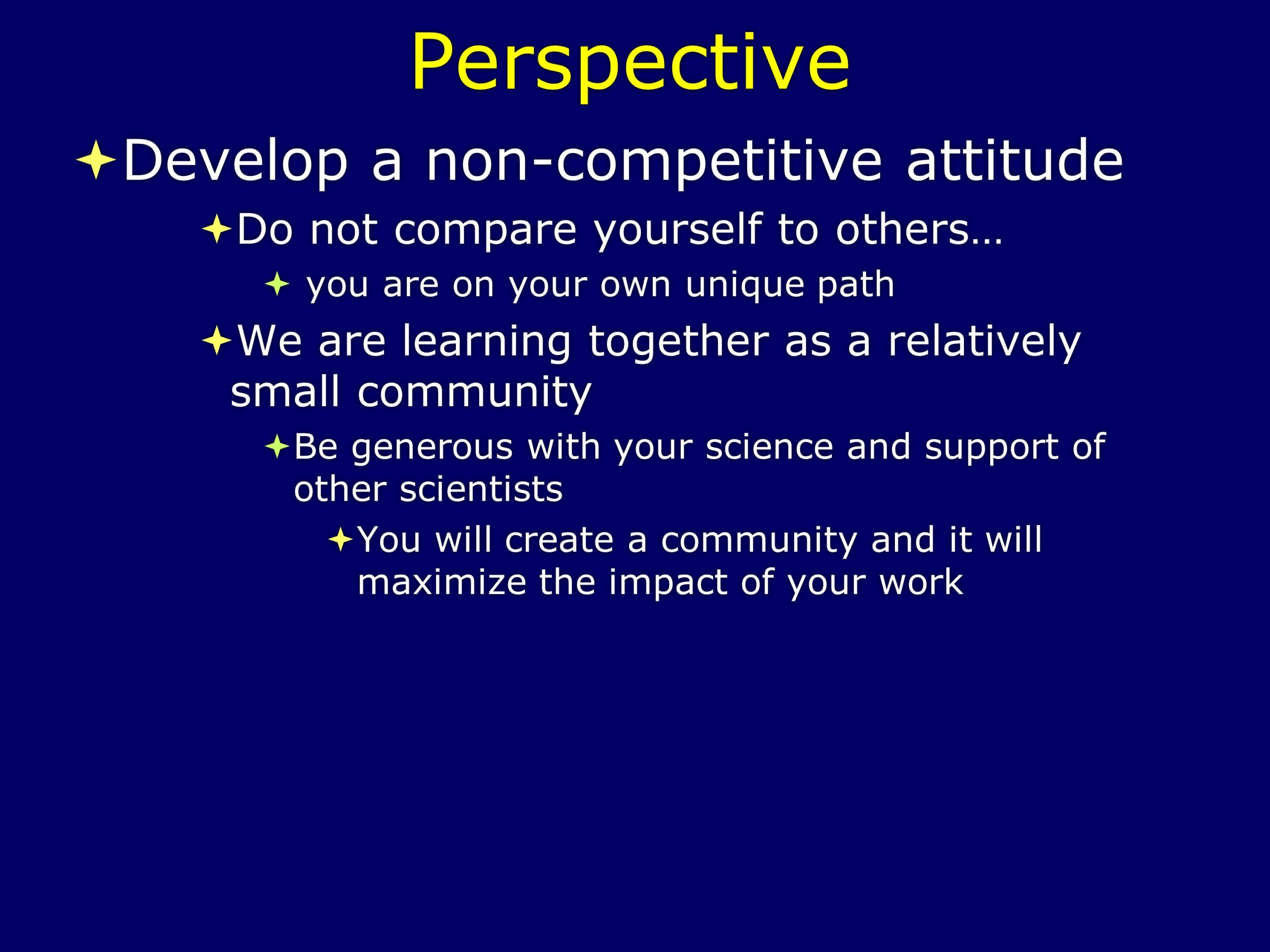
It’s also important to develop a non-competitive attitude, as much as possible. Some people are intrinsically very competitive. But we all are on our unique paths. It’s nice of Cara to share her path with us, I really give you a lot of credit for your persistence, and that’s essential. We all have stories like that, but our paths are unique, our challenges are unique. So it doesn’t help to compare yourself to others, just do the best job that you can. At the end of the day, that’s what you need to know.
We are learning together as a relatively small community. So, be generous with your science, and support other scientists. By doing so, you will create a community and you will also maximize the impact of your work.

I think it’s important to be humbled by this job that we’re in. It’s easy to because we are so exposed to peer review. We use our brains so much, and our brains are a biological sieve, We’re always challenged by having to learn new things, and we have to solve new problems. It’s important to recognize how privileged we are, because we get to pursue our own interests. There are a lot of jobs where you don’t get to do that. We get to be fully engaged, and we get to chart our own path. We are very fortunate to have that kind of job.
Similarly, practice humility. Choose your metaphor here. We’re just laying bricks, we’re not going to solve the world’s problems. Maybe some of you will, but I don’t know that I will. We’re standing on the shoulders of giants.
In line with that, you want to keep your expectations realistic. Problems can be slow in research, and advancement can be incremental. Once in a while something amazing happens, and that’s terrific.
Persistence and Resilience 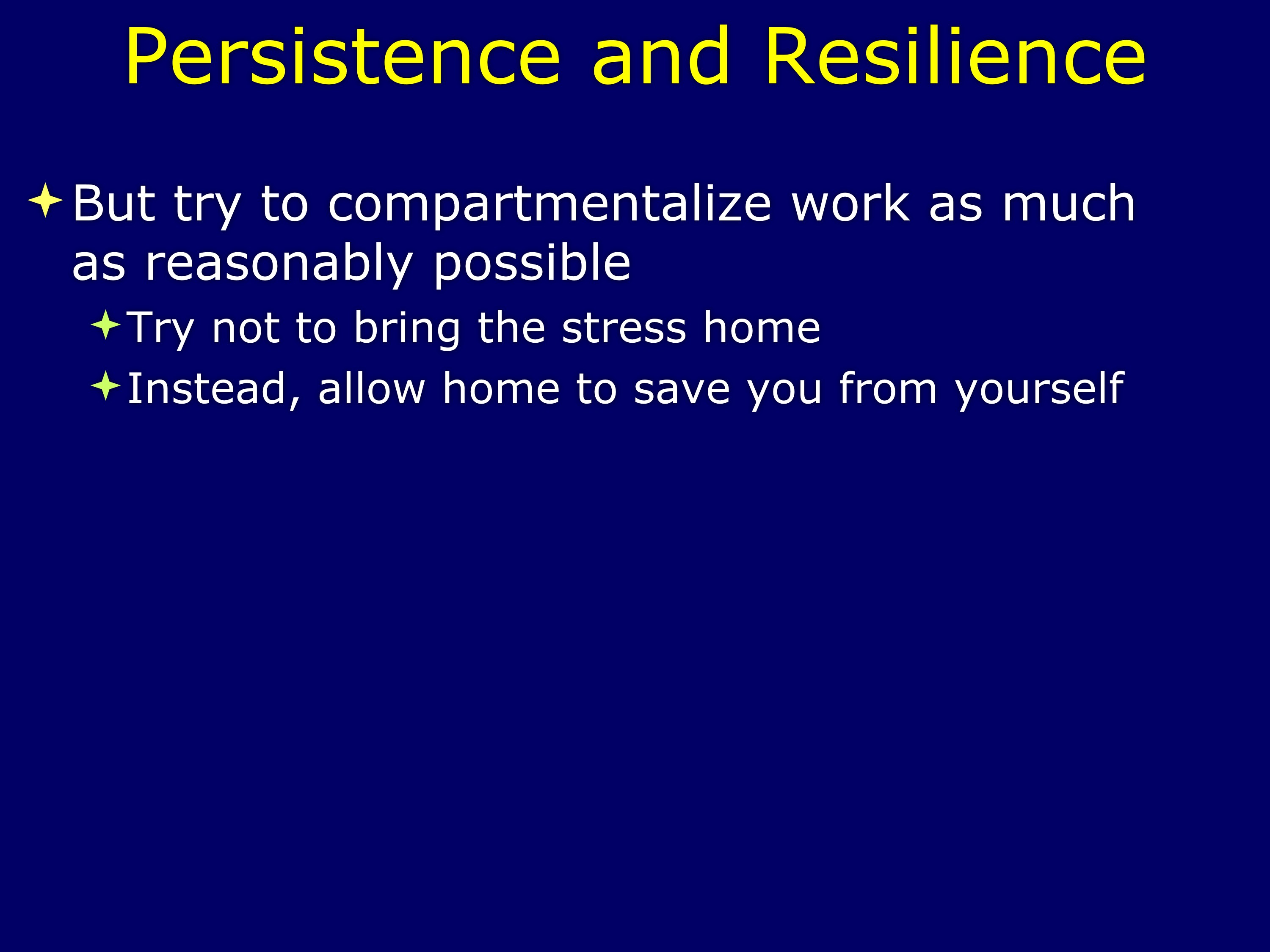
Set up your supports. This is persistence here. Make your family part of your team. Or better yet, make them your research participants. As I have done: That’s my son and daughter there.
Bring your child or spouse to work so they understand what you do.
And communicate with your spouse or your family and partners about deadlines and work stressors.
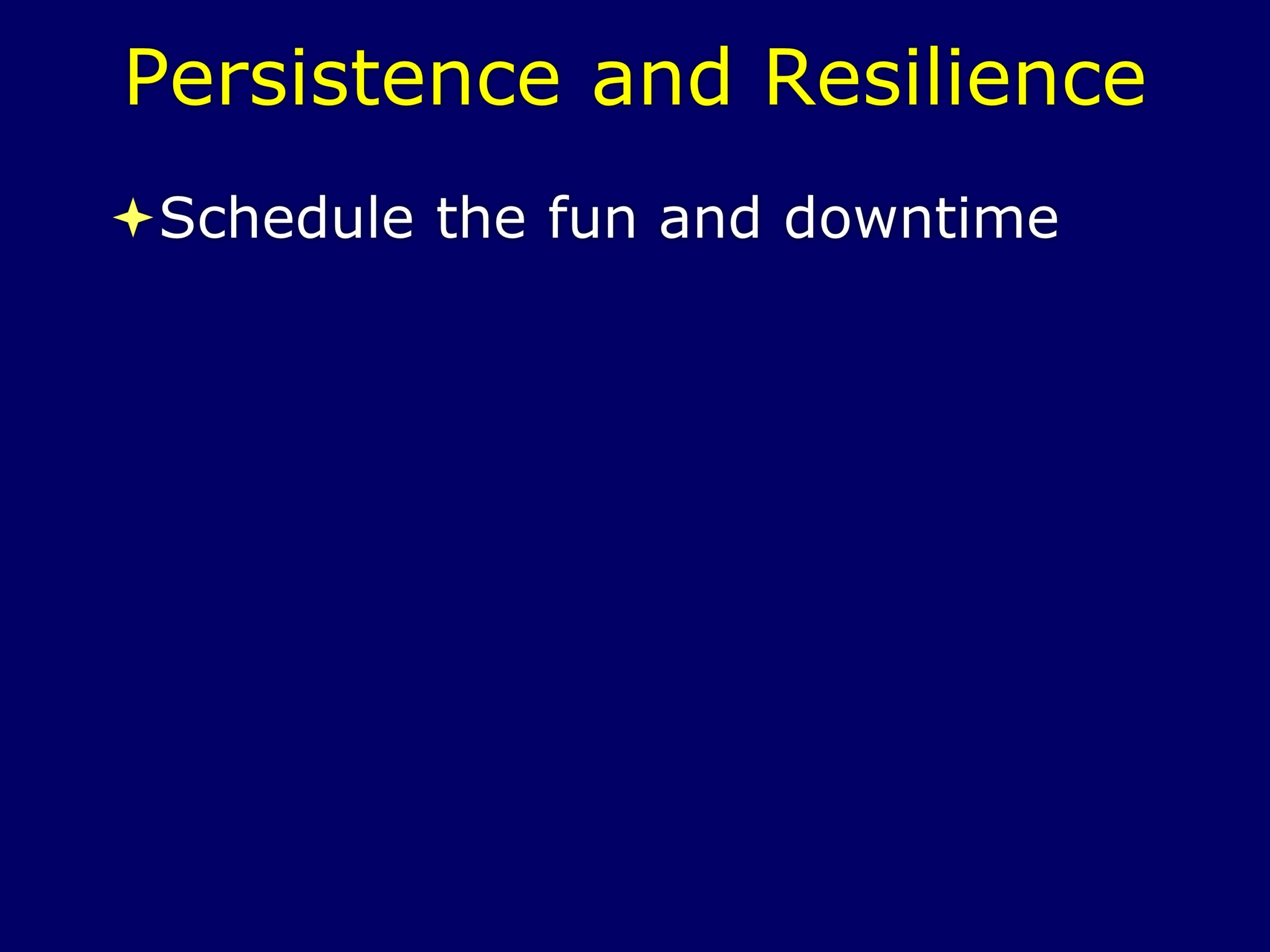
This is about persistence. While it’s important to communicate with your family about work, you do want to compartmentalize as much as possible. Try not to bring the stress home. Just drop it, put in a good day and leave it there.
Preservation
Rather than think that my family is taking me away from work and that should be a source or stress, actually my family saves me from myself in many ways. When they’re not around, that’s when I’m working until 3 in the morning.
Schedule your downtime. Actually put it in your schedule. You have to, otherwise you’ll neglect it. And then do a lot of fun things.
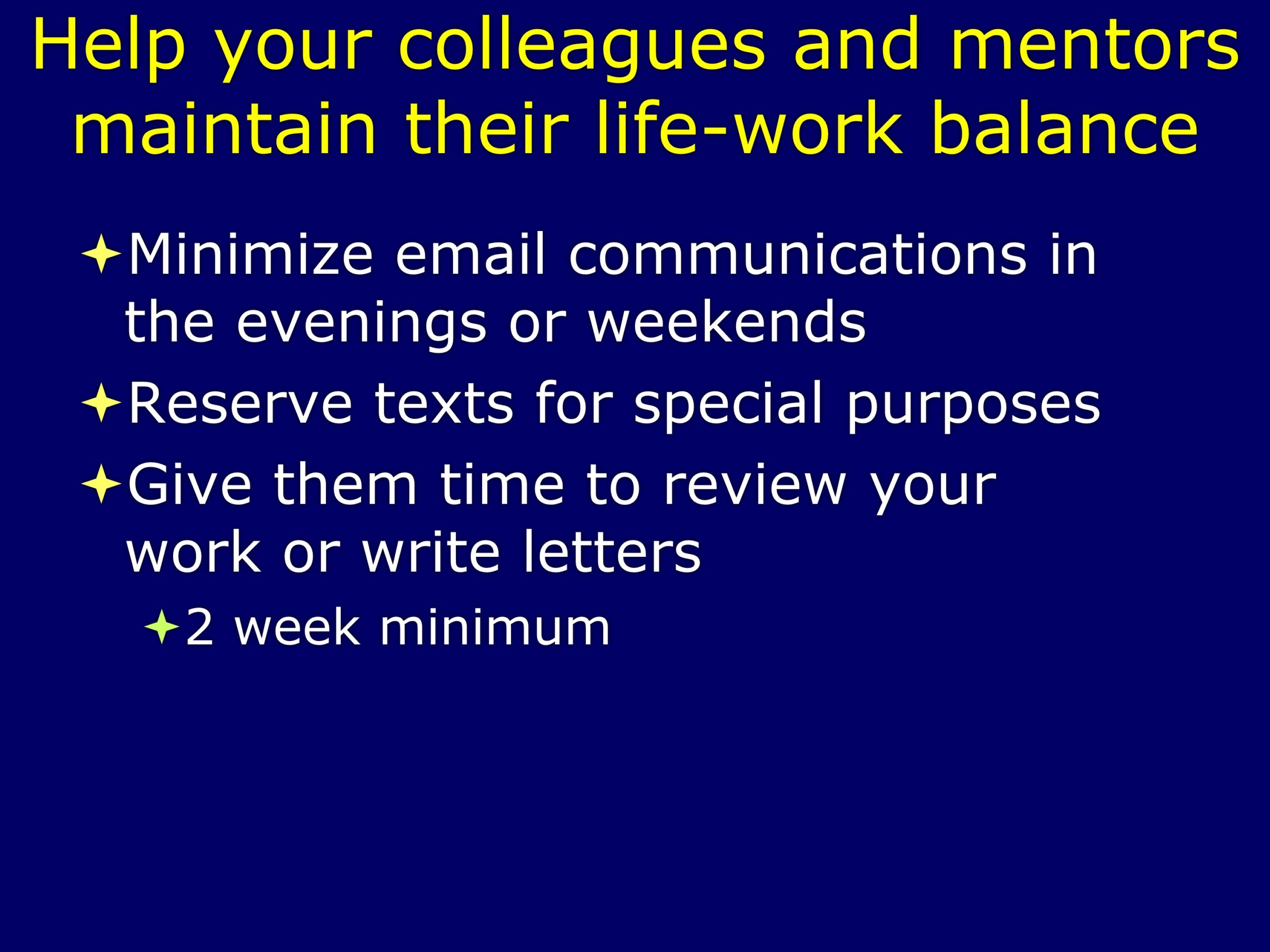
This one was for my students, because I gave them this presentation.
Help your colleagues and mentors maintain their life-work balance. So, minimize email communications in evenings and weekends. Of course there are deadlines, and times when this isn’t true — but try to minimize it.
Reserve texts for special purposes.
Give them time to review your products, at least two weeks.

The bottom line is you just have to try a lot of different things and see what works for you.
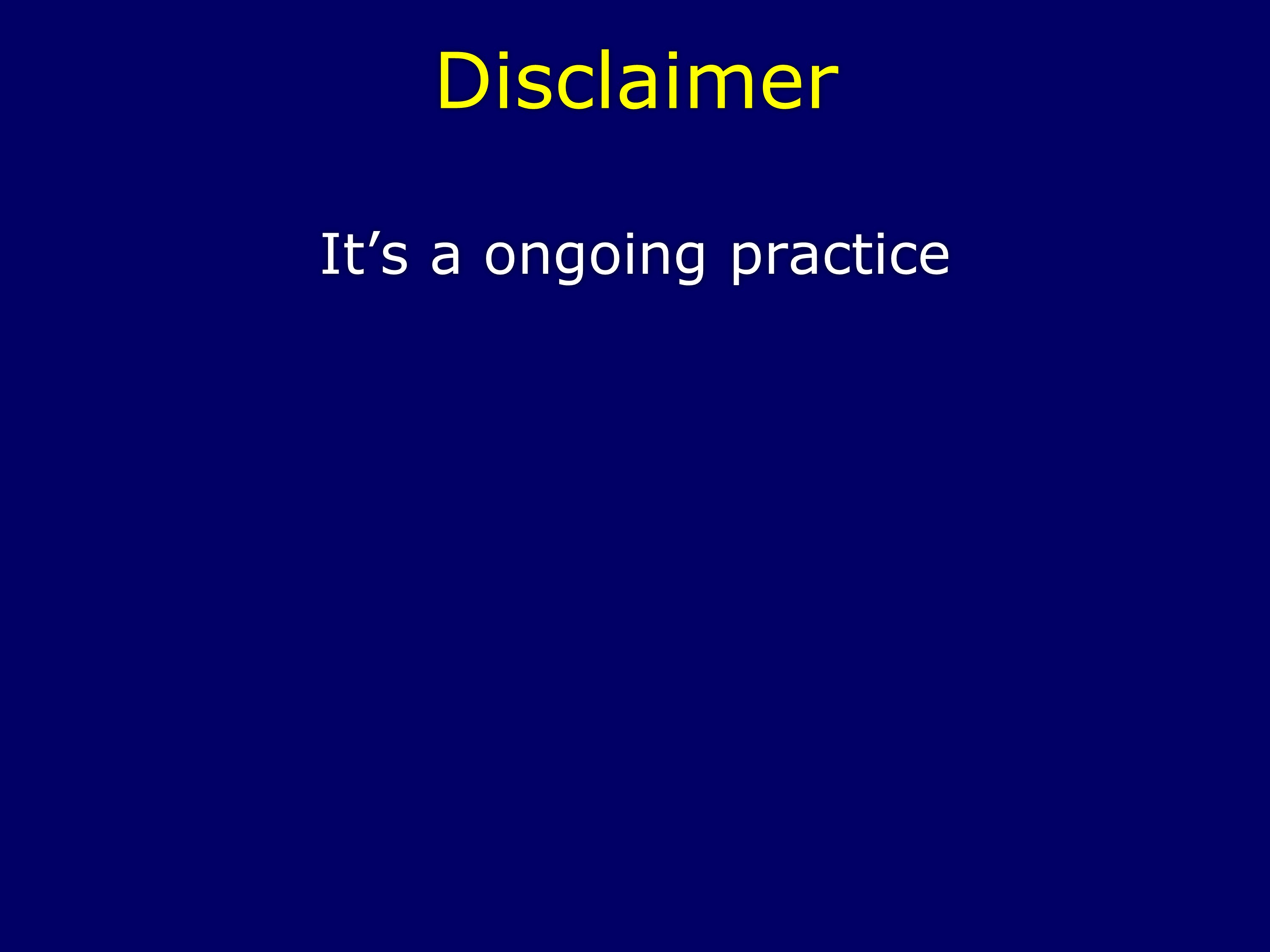 And this is my wife’s response. When I said, “Yeah, I was asked to give a talk on life-work balance.” She said, “Hmmm. Interesting.” So it’s an ongoing practice for me, too.
And this is my wife’s response. When I said, “Yeah, I was asked to give a talk on life-work balance.” She said, “Hmmm. Interesting.” So it’s an ongoing practice for me, too.